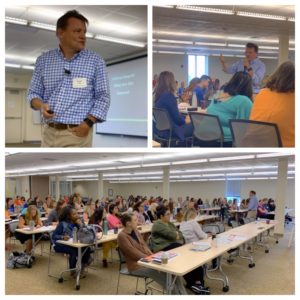You Had Me at Hello: A Winning Part I Seminar on the Importance of Family Engagement
By Allie Long

On August 28th, a sold-out crowd of roughly 150 child welfare professionals gathered at the Center for Child Protection in Austin, TX, for a seminar on the importance of family engagement. Amidst the coffee and pastries, there were caseworkers, therapists, case managers, and social workers alike. On this particular Wednesday, these child welfare professionals convened to ask the question: how do we engage our most challenging parents, caregivers, and foster parents in the process of building a successful treatment plan for their child?
Dr. Scott Sells, founder of Parenting with Love and Limits and the Family Trauma Institute, believes that the answer might be more straightforward than we think. “Families will do well if they can,” Scott said. “They just need the concrete tools, inspiration, and confidence to get to that point.”
“You had me at hello”: Engaging Challenging Families was the first of two free training seminars to be held on the importance of family engagement. Both events are co-hosted by the Texas Institute for Child & Family Wellbeing and the Texas Center for Child and Family Studies, which is the 501c3 nonprofit arm of the Texas Alliance of Child and Family Services (TACFS), and sponsored by Cynthia Franklin, Ph.D. The second workshop will be held on October 17th of this year.
Whole Family, Holistic Support
“I remember my first job as an alternative school counselor in an anger control group,” Scott recalled. “In graduate school, I was taught to ask kids ‘how do you feel?’ But that’s not really the right question to ask angry adolescents. I made a commitment at that point that if I ever made a presentation for my colleagues, it would not focus on theory as much as the practical applications necessary to better serve the families and communities of the children we work with.”
In this first workshop, Scott shared his key reasons why parents can be so difficult to motivate during the treatment process and, more importantly, how to fix this.
While there have been many models developed to help children who have experienced trauma, Scott addressed the elephant in the room: there aren’t many tools out there to support the family that has experienced trauma. And if the family remains unchanged, they will be just as traumatized as the child. In order to really help a child avoid relapse, parent engagement is key.
Tools To Take With You
In addition to sharing actual footage from several of his own personal sessions with his clients, Scott walked attendees through a motivational script that he had personally developed to begin treatment on a stronger footing with each client’s family. These questions included:
 By providing attendees with concrete tools to navigate crucial introductory conversations with clients’ families, Scott is reworking the discourse around each family’s potential to thrive.
By providing attendees with concrete tools to navigate crucial introductory conversations with clients’ families, Scott is reworking the discourse around each family’s potential to thrive.
To learn more about Scott, you can visit his website. If you’re interested in attending the second part of this training on October 17th, you can register here.
